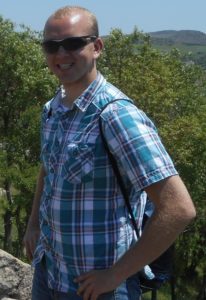The MARCUS conference (Mid-Atlantic Regional Conference for Undergraduate Scholarship), is an annual conference where students can present their research to other students, professors, and the public. In 2015, the conference was held at Randolph College on October 10th. The conference is multidisciplinary where students can share a topic using knowledge and methods from a variety of fields.
Andrew Dittmar, a senior at Roanoke College, was one of the students who participated in the conference. Andrew was involved with the History department for his research project. The project was titled: “”Discovering Liberty: Defining Individualist Anarchism in Liberty, 1881-1908″. It focused on a periodical titled “Liberty”, which covered a radical political philosophy known as individualist anarchism. Andrew’s goal was to investigate the political philosophy and how it managed to become a part of the magazine.
Andrew first came across his research topic while searching for a topic for his Historical Methods course.
“I was struggling to come up with a topic, as my primary historical interests lie in the ancient world and in turn-of-the-20th-century Russia. I was doing a simple Google search trying to somehow unite one of my areas of interest with our course era, and I stumbled across the first page of the first issue of Liberty in 1881. What struck me was a particular page feature a full length eulogy in poem form honoring Sophia Perovskaya, a Russian revolutionary who had, earlier in 1881, been involved in the assassination of Tsar Alexander II, and had been executed for it. The poem continually referred to her action as having been heroic and necessary; I was intrigued, and kept reading. What I discovered was a full-fledged political ideology taking form in the pages of a newspaper”.
One of the things Andrew enjoyed at the conference was how the panel sessions worked.
“I was a part of a five-person student panel, and each of us had researched dramatically different things. My fellow panelists talked about: neurotransmitters in rats; women in French literature; a skeleton used by secret societies at Bennington College; and sound wave patterns. I have no idea why we were all put together, but I learned a lot. It was really cool to see what other students at other schools were researching.”
To anyone considering doing research, Andrew says:
“I know research in a humanities subject area looks very different than research in hard science, but in both instances, research is about uncovering a story, the story behind what, how, and why things are the way they are. Many of these stories have been told, but many are still waiting to be told. So always keep your eye open for a story that you can uncover and tell, because they’re all around you.”
